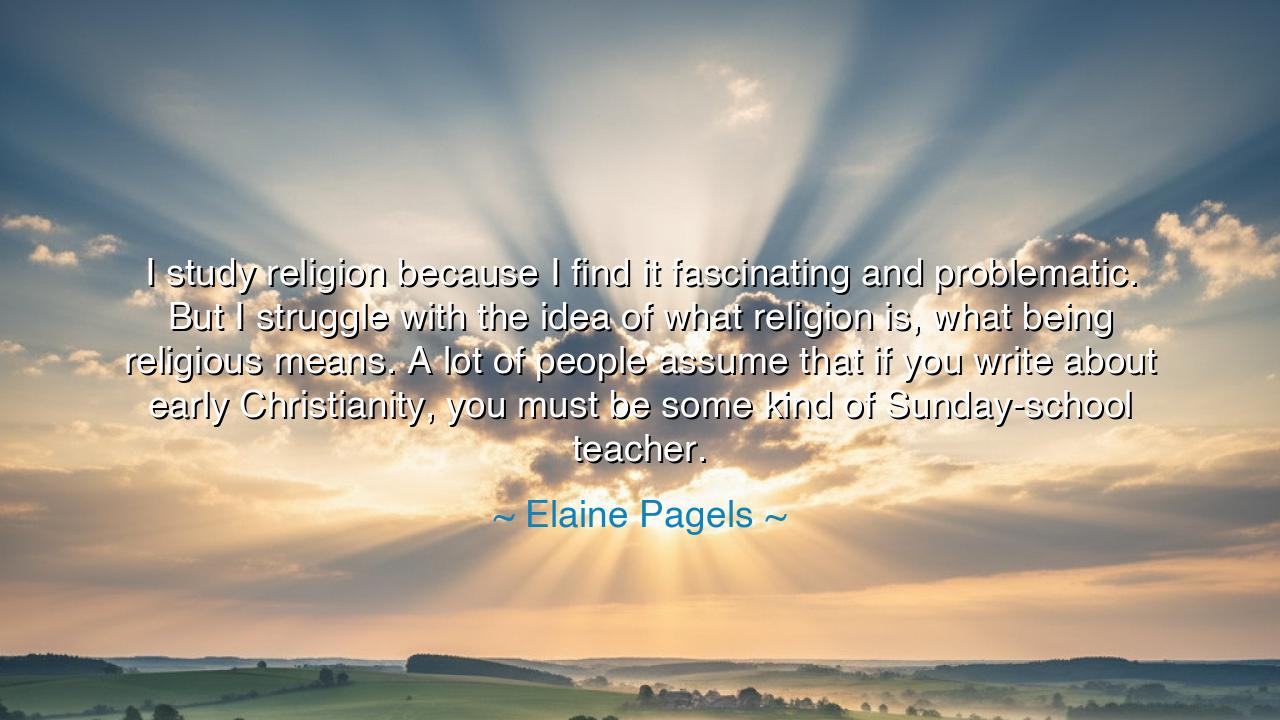
I study religion because I find it fascinating and problematic.
I study religion because I find it fascinating and problematic. But I struggle with the idea of what religion is, what being religious means. A lot of people assume that if you write about early Christianity, you must be some kind of Sunday-school teacher.






Hear the voice of Elaine Pagels, scholar of ancient mysteries, who declared: “I study religion because I find it fascinating and problematic. But I struggle with the idea of what religion is, what being religious means. A lot of people assume that if you write about early Christianity, you must be some kind of Sunday-school teacher.” These words are not the simple confession of an academic; they are a window into the eternal tension between knowledge and faith, between inquiry and devotion, between the seeker of truth and the guardian of tradition.
At the heart of her saying lies the dual nature of religion: it is both a source of profound meaning and of profound conflict. To call it “fascinating” is to honor its beauty—the poetry of ritual, the depth of myth, the comfort of community, the yearning for the divine. But to call it “problematic” is to name its shadow—the divisions it creates, the dogmas that silence inquiry, the power it wields to bind or to oppress. Pagels does not study out of blind reverence, nor out of contempt, but out of the recognition that in religion lies the story of humanity’s highest dreams and its darkest struggles.
Her words remind us also of the burden of assumptions. She says that many suppose a scholar of early Christianity must be like a Sunday-school teacher, preaching rather than questioning, affirming rather than examining. But her path is different. Like Socrates in Athens, who dared to ask what justice truly is, she dares to ask what it means to be religious, what it means to speak of God, what truths lie behind the texts and traditions that shaped civilizations. This is not the voice of a catechist, but of a philosopher—one who seeks wisdom even when it unsettles.
Consider the story of Martin Luther, the monk who studied Scripture with devotion. He began as a servant of the church’s teaching, yet the more he studied, the more questions arose. He asked why indulgences were sold, why traditions held sway above the words of the text, why the truth was chained by authority. His questions broke open the Reformation, shaking Europe to its foundations. Like Pagels, he struggled with what it meant to be religious—and his struggle gave rise to transformation. Inquiry is not the enemy of faith, but often its purifier.
The deeper meaning of Pagels’s words is that to study religion is to stand in a place of tension: to love what it offers, but to wrestle with what it demands. To be too reverent is to lose sight of its flaws; to be too critical is to lose sight of its beauty. True wisdom lies in walking between, acknowledging both its light and shadow. The religious experience is not simple—it is as vast and contradictory as humanity itself.
The lesson for us is profound: do not fear to question what seems sacred, nor despise what has inspired generations. Let your study be both loving and skeptical, open and discerning. Do not assume that those who study faith must be preachers, nor that those who critique it must be unbelievers. There is a nobler path: to approach religion as one approaches a great mountain—awed by its majesty, yet alert to its dangers, and determined to climb with eyes wide open.
Practical steps may follow: if you are drawn to faith, let your belief be tempered by reflection. If you are drawn to study, let your analysis be warmed by compassion. Read not only the texts of devotion, but the histories of struggle, the voices of the forgotten, the dissenters as well as the saints. In this balance lies truth.
Remember always: religion is both fascinating and problematic. To study it is not to preach, but to wrestle; not to settle, but to seek. And in this seeking, we find not only the story of God, but the story of ourselves.






AAdministratorAdministrator
Welcome, honored guests. Please leave a comment, we will respond soon